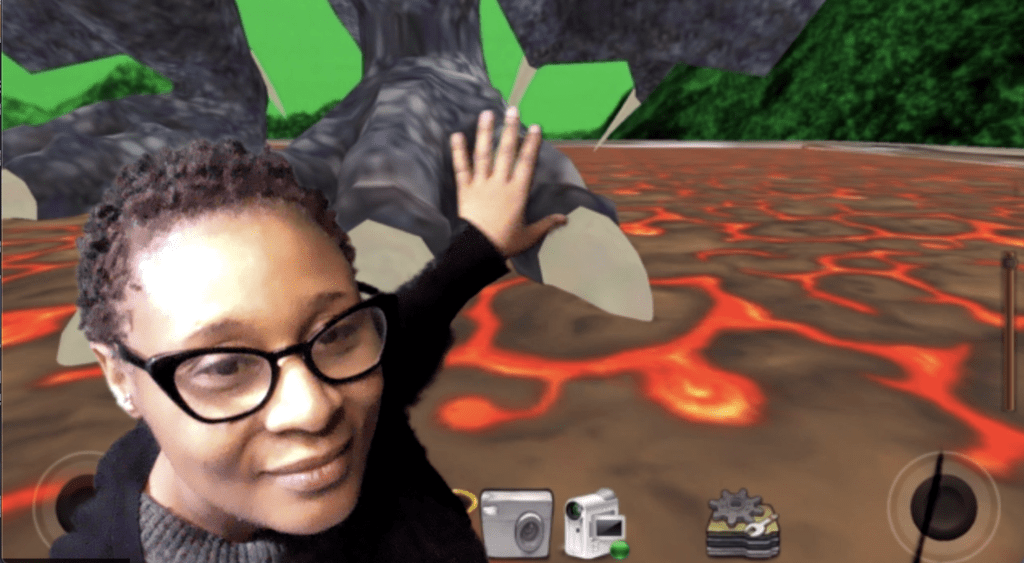Playing With Dragons – Guest Blog

By Lesley Simpson-Gray
I’ve found that creativity often comes when I’m looking for ways to solve a problem or bridge a gap. The issue for me this year is that I’m super-excited about the future applications for the Virtual Sandtray®© (VSA) and virtual reality (VR), but I’m yet to put together a plan (and a budget) for the hardware that would make this happen. Sadly for me, COVID-19 marked the start of my journey into telehealth and online therapy and I was yet to discover VSA when I purchased a new iMac this year. My current hardware easily supports my passion for creating digital art, however I doubt it will enable me to have a full-scale adventure into the world of VR and gaming. However, the benefit of this dilemma is that I can empathise with the therapists I support, who also need to find effective and inexpensive ways to bring creative, online interventions into their practice.
Therapists who come to my training days often struggle to visualize what it means to combine VSA, VR, and ‘getting into your own sandtray’. It has become more important than ever to help them understand how VSA promotes ‘cultural competence’ (Stone, J. 2020) and how they can use to an online sandtray to develop deeper, more immersive experiences through digital play therapy.
I’ve been really inspired by the way that therapists can interact with their online clients through the background images they create on a green-screen. By allowing myself to be curious and playful, I began to wonder what it would be like to download a video of a VSA sandtray as a background, and interact with the image. Fortunately, the large, animated dragon in the video was very obliging and sat perfectly still while I looked back and forth in amazement between the image and my screen!
I love using the camera in VSA to create different perspectives, but a life-size dragon immediately transported me to a place where I could focus on the experience of interacting with it, instead of controlling the camera. It became far easier to imagine what it would be like to ‘meet’ an actual dragon whilst sitting way too close to a landscape of hot lava.
I love how I’m suddenly more aware of my fear and excitement. I’m looking forwards to helping my clients to create sandtrays using camera positions and dimensions which allow us to further explore their images as backgrounds on a green-screen.
I’m happy that I can apply some new skills and flexibility to find a fun and an exciting way to support other therapists on their journey towards achieving competence, cultural awareness, and comfort in their online practices (Stone, J. 2020). However, I’m also left with my original dilemma – I’m more excited than ever to pursue my interest in bringing VR technology into my practice and bridge the gap between my current hardware and the technology I’ll need. I’ll just have to imagine (for now) about the creative VSA interventions I’ll discover once I invest in a VR-ready pc and headset!
For more information about digital play and Digital Play Therapy, see Stone (2020).
References:
Stone, J. (2020). Digital play therapy: A clinician’s guide to comfort and competence. Routledge.

Lesley Simpson-Gray is based in the UK and has worked in private practice for nearly 4 years, since qualifying with a Postgraduate Diploma in the Therapeutic Application of the Arts and an MA in Integrative Child Psychotherapy. She is commissioned to provide therapeutic life-story work and psychotherapy for her local authority post-adoption teams and accepts referrals from private clients and primary and secondary schools across 3 counties.
Lesley has worked exclusively online since March 2020 and enjoys the challenge to find new and creative ways to use digital interventions and images in her practice. She has recently launched her Cyber-Creative Confidence Challenge, a 6-week programme to support creative arts counsellors and psychotherapists to develop confidence using online interventions and feel comfortable engaging with their clients.
LinkedIn: https://www.linkedin.com/in/lesleysimpsongray/
Facebook: https://www.facebook.com/Cybercreativetherapy
Website: https://www.lesleysimpson-gray.com